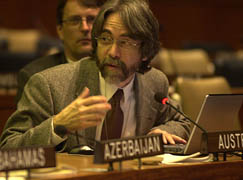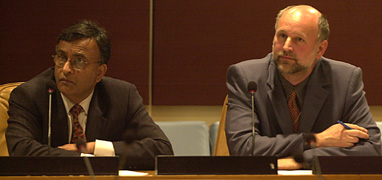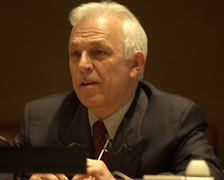|
|
|||||||||||||||||||||||||||||||||||||||||||||
|
|||||||||||||||||||||||||||||||||||||||||||||
|
Events convened on Friday, 5 April 2002 |
|
|
Progress toward
sustainable production and consumption: a civil society assessment
Bas de Leeuw, UNEP, presented a UNEP/Consumer International global survey on the status of the UN Guidelines for Consumer Protection. The survey received responses from 51 countries, and indicated low awareness about the Guidelines, and found that only a few governments promote product testing and ecolabelling, or conduct research on and measure progress toward sustainable consumption. De Leeuw reported that governments are content with the Guidelines and willing to implement them, but they require capacity building on sustainable production and consumption. He presented a UNEP/Consumer International initiative to develop a three-year training programme on sustainable consumption in cooperation with national cleaner production centers in Africa, Latin America, Asia and Eastern Europe. Carolyn Nunley Cairns, Consumers Union, highlighted the need for sustainable alternatives to conventional products that are easily available, identifiable, attractive, affordable and practical, as well as for research and development of new technologies to achieve sustainable consumption. She highlighted the role of ecolabelling, and said the WSSD and future work programmes should: address the need for policy environments for ecolabelling and producer responsibility; allow the use of ecolabelling and ensure that trade agreements do not interfere with sustainable consumption; and review existing ecolabelling programmes. James Rochow, Alliance to End Childhood Lead Poisoning, addressed the problem of lead poisoning in the context of sustainable production and consumption. He described efforts to substitute leaded gasoline with harmless fuels, highlighting obstacles such as the failure to use the precautionary principle in the transition to new fuels and an emphasis on victims rather than on sources of pollution, and stressed the need for regulatory approaches to the phase-out of lead in gasoline, and monitoring and measuring progress. Hanne Gro Haugland, Norwegian Forum for Environment and Development, highlighted the need to address unsustainable military production and consumption and redirect military expenditures toward sustainable development. She presented a position paper by her organization, which calls on world leaders to reconfirm the Rio Principles related to peace and agree to study the linkages between military production and consumption and sustainable development. Yin Shao Loong, Third World Network, explained the imbalance between the use of resources by globalization's production and consumption machine and global environmental and social problems, and highlighted the lack of political commitment to address this systematic inequality in the current WSSD discussions. He warned of cultural, environmental and social consequences of transferring the production and consumption patterns of industrialized countries to the rest of the world.
|
|
Global Science Panel on Population in Sustainable Development Presented by the International Institute for Applied Systems Analysis (IIASA) Hania Zlotnik, International Union for the Scientific Study of Population, emphasized that the complex interrelations between population and the environment and their implications for sustainable development make it difficult to distill courses of action that apply to all populations. She noted that future population increases will be concentrated mostly in urban areas of developing countries, and stressed that discussions of sustainable development must consider the challenges posed by these trends.
Wolfgang Lutz, IIASA, introduced the science-policy Statement on Population in Sustainable Development, which was the result of extensive discussions by the Global Science Panel on Population and Environment. The Statement calls on the WSSD to recall that human beings are at the center of sustainable development, by taking full account of how population and society interact with the environment. It highlights the demographic diversity of the world, with population growing in some areas and shrinking in others, and levels of mortality, mobility, urbanization and education varying among and within regions, and emphasizes that this diversity requires differentiated responses. The Statement emphasizes the impacts of population on development and the environment, noting that rapid population growth can exacerbate problems such as freshwater depletion, climate change, biodiversity loss and degradation of agricultural lands, and that high consumption rates magnify the environmental impacts of population growth in high-income countries. It emphasizes that the majority of the world's population will live in urban areas by the end of the decade. The Statement underscores that policy must account for differential vulnerability within populations, as deteriorating environmental conditions affect different countries, populations and households differently, and says vulnerability can be reduced by promoting empowerment, investing in human resources, and fostering participation in public affairs and decision making. The Statement emphasizes that empowerment through education and reproductive health has multiple benefits for people and the environment, and that efforts to achieve sustainable development should give these policies the highest priority. Discussion: Participants emphasized that the Statement should address, inter alia: migration; the need for more women in public life; women's reproductive health as a human right; and education to reduce unsustainable consumption. Participants emphasized the urgent need to address the absence of language on population issues in the Chairman's Paper.
|
|
Vulnerability, safety nets and sustainable development for the poorest Presented by the World Bank, World Food Programme, and the Government of Bangladesh Sabihuddin Ahmed, Minister of Environment and Forests, Bangladesh, moderated this event, which addressed the relationship between vulnerability and poverty. Tesliuc described the World Bank's efforts to operationalize social risk management through the creation of a Risk and Vulnerability Analysis Toolkit, which helps governments identify risks and prioritize and develop intervention programmes. He highlighted the use of the Toolkit in Guatemala and its applications in addressing poverty of consumption, as well as poverty of education, health and social opportunity. Werner Kiene, World Food Programme (WFP), described WFP's application of risk and vulnerability analysis in Bangladesh, which found that, when faced with food shortages, households tend to give food preference to breadwinners, reduce expenditures on education and health, avoid entrepreneurial risk, and use such "destructive coping mechanisms" as depending on expensive loans and mortgages and selling productive assets. He said food transfers can help break poverty cycles and should be combined with non-food outreach such as training and credit provision, thereby enabling people to take advantage of development opportunities. Kiene outlined the Vulnerable Group Development Programme and Vulnerable Group Feeding Programme, which were used in Bangladesh to reduce household vulnerability by providing time-limited food transfer, and highlighted the successful aversion of famine following a severe flooding incident. Discussion: Participants discussed issues such as the dangers of disrupting market mechanisms through food transfer programmes, and strategies for bringing poverty and vulnerability linkages to the attention of the WSSD process.
|
|
|
|
|
The Earth Negotiations Bulletin (ENB) on the Side is a special publication
of the International Institute for Sustainable Development (IISD) in
cooperation with the United Nations Development Programme (UNDP). The Editor
of ENB on the Side is Kira Schmidt
kira@iisd.org
|
|
|
|
| © 2002, IISD. All rights reserved. |
|




